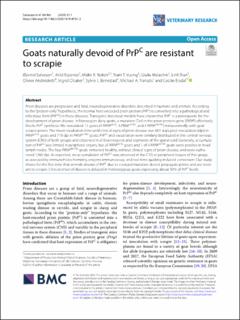| dc.description.abstract | Prion diseases are progressive and fatal, neurodegenerative disorders described in humans and animals. According to the "protein-only" hypothesis, the normal host-encoded prion protein (PrPC) is converted into a pathological and infectious form (PrPSc) in these diseases. Transgenic knockout models have shown that PrPC is a prerequisite for the development of prion disease. In Norwegian dairy goats, a mutation (Ter) in the prion protein gene (PRNP) effectively blocks PrPC synthesis. We inoculated 12 goats (4 PRNP+/+, 4 PRNP+/Ter, and 4 PRNPTer/Ter) intracerebrally with goat scrapie prions. The mean incubation time until clinical signs of prion disease was 601 days post-inoculation (dpi) in PRNP+/+ goats and 773 dpi in PRNP+/Ter goats. PrPSc and vacuolation were similarly distributed in the central nervous system (CNS) of both groups and observed in all brain regions and segments of the spinal cord. Generally, accumulation of PrPSc was limited in peripheral organs, but all PRNP+/+ goats and 1 of 4 PRNP+/Ter goats were positive in head lymph nodes. The four PRNPTer/Ter goats remained healthy, without clinical signs of prion disease, and were euthanized 1260 dpi. As expected, no accumulation of PrPSc was observed in the CNS or peripheral tissues of this group, as assessed by immunohistochemistry, enzyme immunoassay, and real-time quaking-induced conversion. Our study shows for the first time that animals devoid of PrPC due to a natural mutation do not propagate prions and are resistant to scrapie. Clinical onset of disease is delayed in heterozygous goats expressing about 50% of PrPC levels. | en_US |

